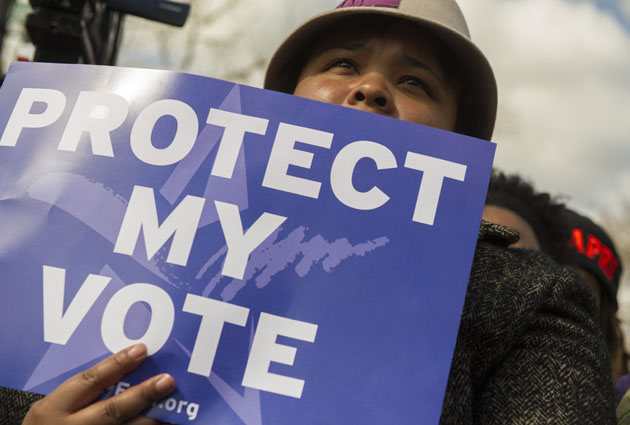
Rod Lamkey Jr./ZumaPress
Yesterday, about 60,000 former felony offenders in California were officially granted the right to vote. Earlier this week, California Secretary of State Alex Padilla announced that the state would settle litigation over laws that had barred low-level felony offenders under community supervision from voting.
In 2011, California lawmakers passed bills to reduce overcrowding in state prisons by diverting low-level felony offenders to county jails and community supervision, in which recently released prisoners are monitored by county agencies. Then-Secretary of State Debra Bowen told election officials in December 2011 to extend the state’s ban on felon enfranchisement to those offenders, noting that being under community supervision was “functionally equivalent” to parole. Civil rights groups filed a lawsuit last year to challenge Bowen’s directive.
Last May, an Alameda County Superior Court judge ruled in favor of the offenders, noting that community supervision was different from parole and that the intention of the 2011 law “was to reintroduce felons into the community, which is consistent with restoring their right to vote.” The state appealed the ruling. Padilla’s announcement means the state will drop its appeal and issue new directives to election officials. “If we are serious about slowing the revolving door at our jails and prisons, and serious about reducing recidivism, we need to engage—not shun—former offenders,” Padilla said in prepared remarks.
Lori Shellenberger, voting rights director of the American Civil Liberties Union’s California chapter, says California’s about-face puts it at the front of the movement to restore voting rights to former convicts. “The intent of that law was to improve reentry and improve the prospects for people,” Shellenberger says. “If you’re living and working in your community, and you’re paying taxes, but you’re not given a political voice, it undermines the purpose of that sentencing.”
The state’s decision marks a significant victory for ex-felons at a time when voting rights are under scrutiny across the nation. The Sentencing Project estimates that nearly six million Americans cannot vote as a result of previous criminal convictions. And voter ineligibility disproportionately affects people of color, especially blacks; 1 in 13 African-Americans can’t cast a ballot.
Efforts are picking up to restore the vote to some felons who have done their time. In Florida, which has some of the nation’s strictest voting laws, momentum is gaining behind a ballot initiative that would grant the vote to more than 1.6 million people with past felony convictions. In March, Rep. John Conyers (D-Mich.) introduced a bill that would give former convicts released from all prisons the right to vote in federal elections.
Still, the path to reenfranchisement remains rough for ex-felons. In May, Maryland Gov. Larry Hogan vetoed a bill that would have restored voting rights to 40,000 residents with past convictions. Last year, the ACLU filed a lawsuit challenging a 2011 decision by Iowa Gov. Terry Branstad to reverse a 2005 executive order that restored voting rights for all former felons. The case centers on Kelli Jo Griffin, who was charged with perjury in 2013 after registering to vote in a city election. Earlier that year, Griffin completed a five-year probation for a minor drug offense. She was later acquitted of perjury. Currently, to regain the right to vote in Iowa, ex-felons now must undergo a comprehensive process that includes an application, a criminal background check, and providing proof of paid fines. Of the 14,350 former offenders who have applied for restoration of voter rights since Branstad’s order, just 40 have regained eligibility.













